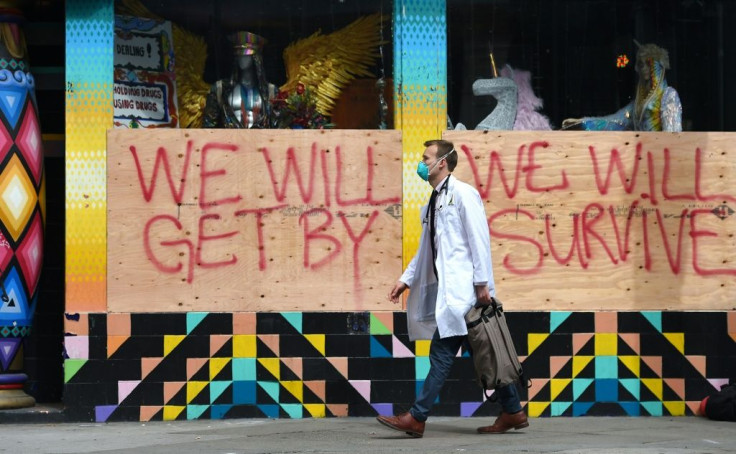Coronavirus USA Update: US Death Toll Hits 118; 7,769 Confirmed Cases

KEY POINTS
- The COVID-19 pandemic in the U.S. continues to inflict a rising toll among Americans
- Confirmed cases rose by 1,875 on Wednesday, with 21 more deaths
- Mild, asymptomatic or otherwise unrecognized infections might have driven the rapid spread of COVID-19
The 32% spike in the number of confirmed COVID-19 cases in the United States on Wednesday compared to Tuesday and a 22% jump in deaths might in all likelihood have been due to undetected infections as the outbreak began to spread.
Undetected infections, which are caused by the slow pace of widespread testing for the coronavirus in the country, has long been seen as a major hindrance to an effective U.S. response to the pandemic, argues the U.S. Centers for Disease Control and Prevention (CDC). It might also have driven the "rapid dissemination" of the coronavirus, according to results from a recent modeling exercise published Monday in the journal Science.
On the other hand, Dr. Anthony Fauci, director of the National Institute of Allergy and Infectious Diseases, said a "technical glitch" caused the delay in production of usable tests in the U.S. Dr. Fauci ascribed this failing to random error and not to any fault by either the CDC or president Donald Trump.
"It was a complicated series of multiple things that conflated that just, you know, went the wrong way," said Dr. Fauci Tuesday. "One of them was a technical glitch that slowed things down in the beginning. Nobody’s fault. There weren’t any bad guys there. It just happened."
As of Wednesday 4:53 p.m. ET, there were 7,769 confirmed COVID-19 cases in the U.S. and 118 deaths. This compares to the 5,894 cases and 97 deaths recorded at about the same time Tuesday. There were 1,875 more cases on Wednesday and 21 deaths compared to Tuesday, according to data from the Center for Systems Science and Engineering (CSSE) at Johns Hopkins University. The data shows a 32% jump in cases and a 22% increase in deaths.
The study published in Science reported mild, asymptomatic or otherwise unrecognized infections might have driven the rapid spread of the severe acute respiratory syndrome coronavirus 2 (SARS-CoV-2), the virus that causes COVID-19 in the outbreak’s earliest days.
Based on reported cases in China and travel data, the study estimates 86% of SARS-CoV-2 infections in the U.S. were undocumented in the weeks before officials instituted stringent quarantines in February.
Undocumented infections can go unrecognized because they come with mild or no symptoms (asymptomatic). This type of infection “can expose a far greater portion of the population to virus than would otherwise occur.”

These undetected cases, however, are often less severe but more common than confirmed infections. But, the study calculates undetected cases are about half as contagious as confirmed cases. Since undetected cases are more common, they might have played an outsize role in spreading SARS-CoV-2, said the study. Surprisingly, 4 in 5 people confirmed with SARS-CoV-2 were likely infected by asymptomatic people that didn’t know they had the coronavirus, based on modeling results.
“These findings explain the rapid geographic spread of [SARS-CoV-2] and indicate containment of this virus will be particularly challenging,” according to the study.
The study also suggests “a radical increase in the identification and isolation of currently undocumented infections would be needed to fully control [SARS-CoV-2].”
On Wednesday around the U.S.:
- Rep. Mario Diaz-Balart, R-FL, is the first member of Congress to test positive for SARS-CoV-2. He said he's feeling better but gave no further details about is condition.
"However, it's important that everyone take this seriously and follow @CDCgov guidelines in order to avoid getting sick & mitigate the spread of this virus," tweeted Diaz-Balart. - Over the past three weeks, three Republican Senators (including Sen. Rick Scott from Florida and Sen. Lindsey Graham from South Carolina) and four Republican congressmen placed themselves in self-quarantine after coming into contact with people positive for SARS-CoV-2. Two Democratic congressmen also did the same.
- Nearly one in four Californians has been ordered to stay home to help curb the spread of SARS-CoV-2. Napa, Yolo and San Luis Obispo counties plus the city of Fresno have issued "shelter-in-place" orders, joining 10 other Northern California counties.
- Minnesota Gov. Tim Walz said 1,700 coronavirus tests are still waiting to be processed because the state can't test them.
- Pennsylvania, which has 133 confirmed coronavirus cases, reported its first death due to COVID-19. Gov. Tom Wolf said the fatality came from North Hampton County and asked all residents to stay home to limit the spread of the coronavirus.
- The New York Stock Exchange (NYSE) will move to fully electronic trading on March 23 after an employee and a trading floor member tested positive for the coronavirus. It also said regulatory oversight of all NYSE-listed securities “will continue without interruption."
- Missouri confirms its first coronavirus death. Gov. Mike Parson said the fatality is a resident from Boone County that was isolated at home.
- With 80 confirmed cases, Michigan has seen the first death from COVID-19. Gov. Gretchen Whitmer announced the death and expressed sympathy for the family of the man that passed away.
© Copyright IBTimes 2024. All rights reserved.





















